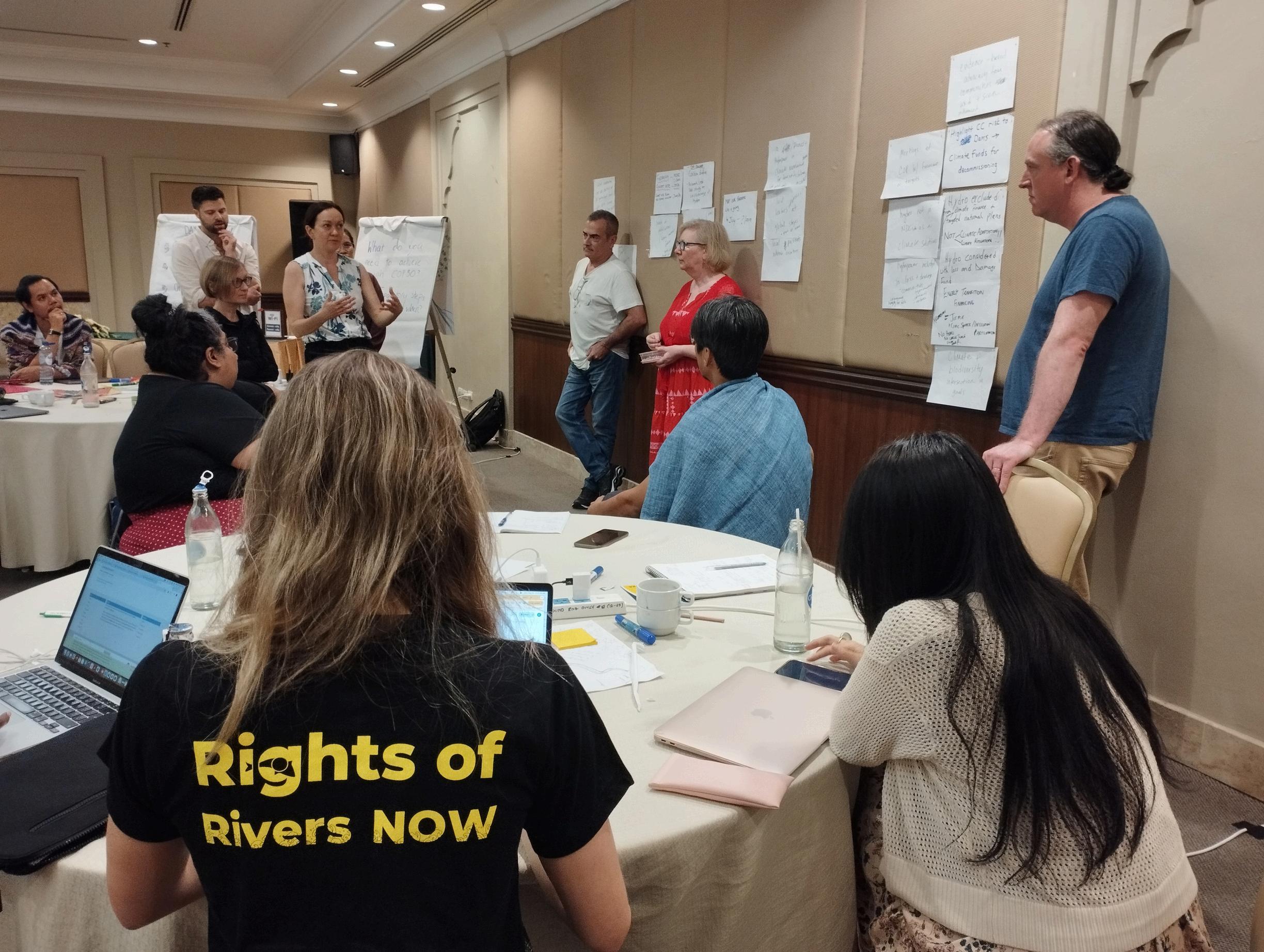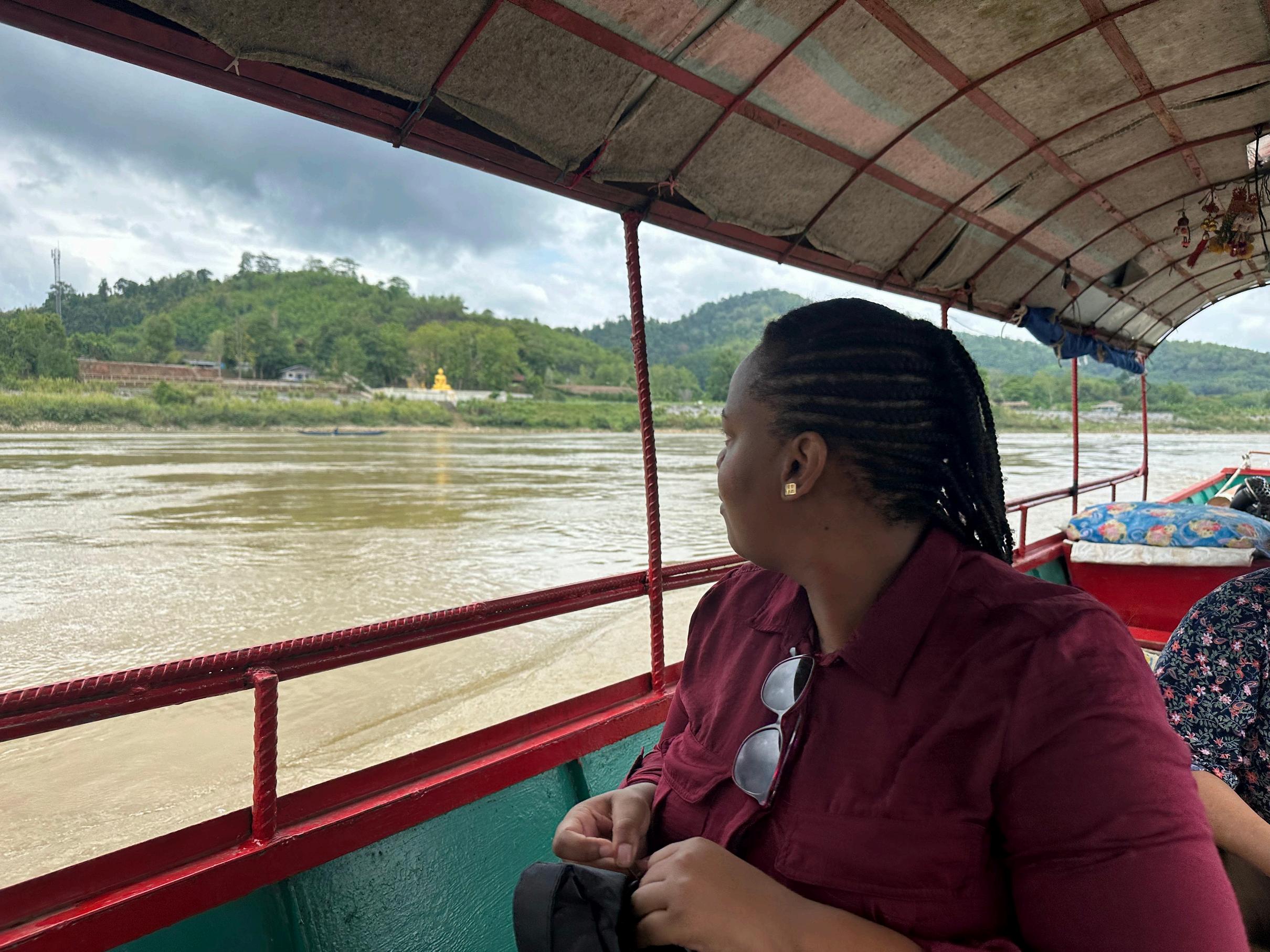
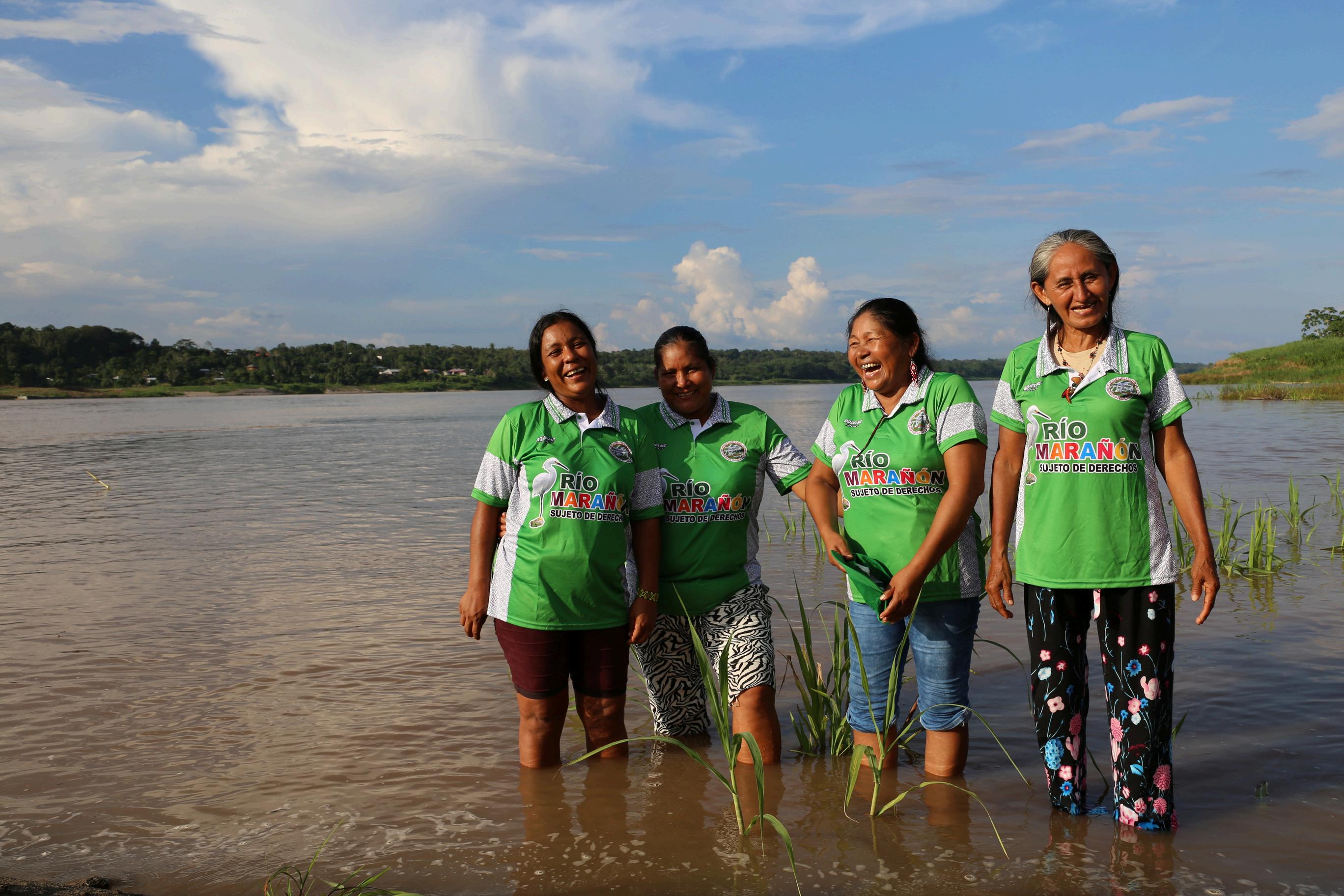







Dear Friends of International Rivers,
As democratic institutions face unprecedented challenges worldwide, International Rivers’ remarkable victories during 2024 give us cause to celebrate the transformative power of community-driven action
Our mission to offer our support so that those defending their rivers and livelihoods against destructive development around the world determine the future of their waterways and ecosystems matters more now than ever
The historic legal recognition of the Marañón River in Peru as a subject with inherent rights stands as a powerful testament to the kind of work International Rivers can accomplish with all of your support After dedicated advocacy by Mariluz Canaquiri Murayari and the Kukama women ' s group Huaynakana Kamatahuara Kana, Peru's courts made a landmark ruling They declared the Marañón River the Amazon's principal tributary has rights to flow freely, remain
unpolluted, and be restored to health The decision recognizes Indigenous communities as the river's rightful guardians
This landmark victory, the first of its kind in Peru, demonstrates how persistent grassroots organizing can transform environmental protection and Indigenous rights And we are delighted that this April, Mariluz's extraordinary leadership was recognized with the prestigious Goldman Environmental Prize, bringing well-deserved global attention
Similarly, our cross-continental work has demonstrated the power of community-driven action In Africa, the OvaHerero community completed a four-year process of documenting their bio-cultural protocols to safeguard the Kunene river and lands against the proposed Baynes dam Meanwhile, our Women and Rivers program has cultivated a powerful movement across Asia, where 14 women from Nepal, India, and Bangladesh
formed the Brahmaputra Women's Alliance and joined over 120 defenders at the Asia Women and Rivers Congress in Thailand
These are positive trends, but our work remains as critical as ever
In 2024, the World Bank reversed course to finance massive hydroelectric projects in Tajikistan and the Democratic Republic of Congo. These mega-dams falsely labeled sustainable will displace tens of thousands, destroy ecosystems, and burden countries with unsustainable debt
The challenges before us remain significant Yet we find hope in the

2024 ANNUAL REPORT
resilience of river defenders worldwide who continue to demonstrate that alternative paths exist paths that honor rivers as living systems essential to our shared future
Our organization stands strong with a clear path forward under continuing leadership and our new strategic plan International Rivers remains steadfast in supporting riverine communities worldwide, guided by the knowledge that protecting rivers means protecting our collective future Your continued partnership in this journey sustains our work and inspires us to continue to reach further
With heartfelt appreciation,

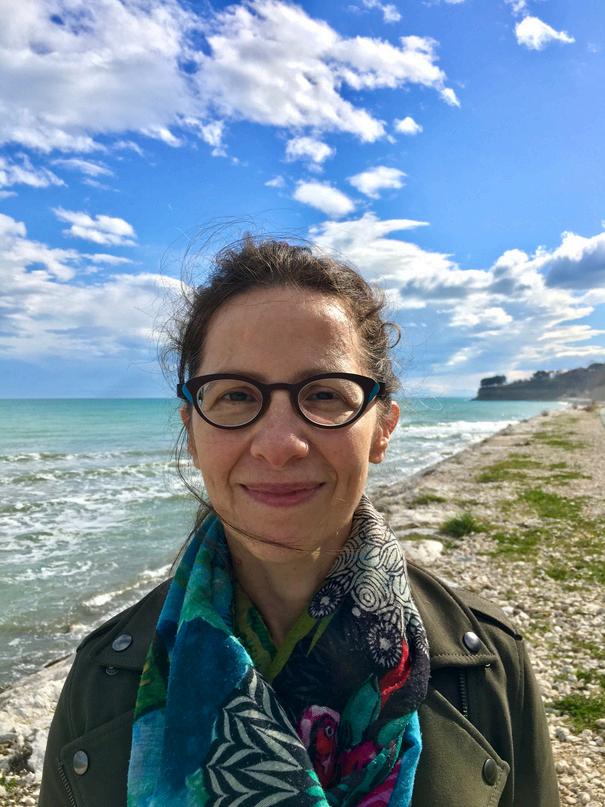
Josh Klemm and Isabella Winkler Co Executive Directors

Melina Selverston-Scher Board Chair

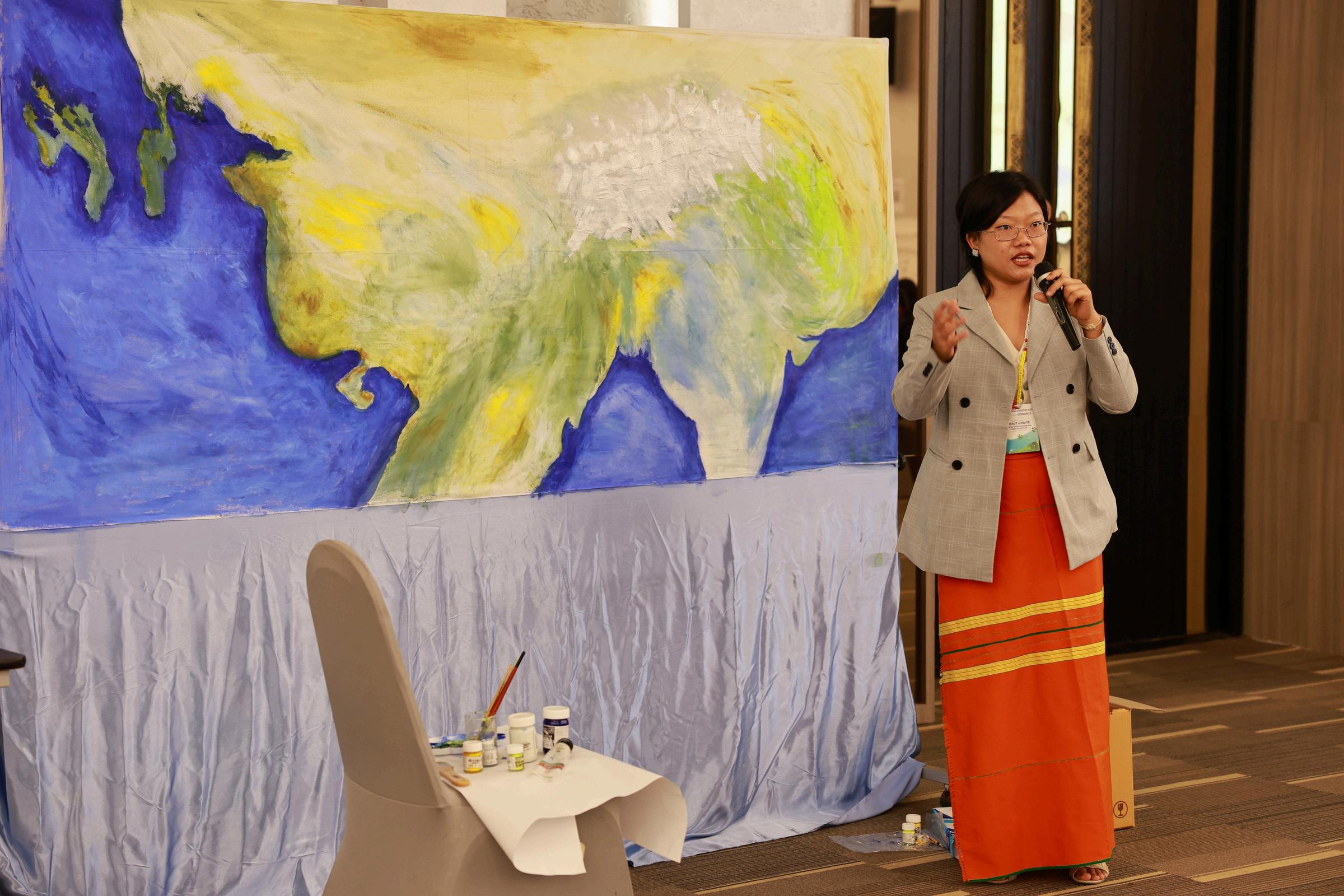
BhanuTatakinviteswomentosewtheirlocalrivers onhercollaborativemapandsharetheirstories, connectingcommunitiesacrossAsia'swaterways
Photocredit:SaowalakJingjungvisut
In 2024, International Rivers continued to develop our Women and Rivers program, creating a tide of solidarity for freshwater protection across Asia
With Women’s Earth Alliance, we held an accelerator focusing on transboundary rivers with 14 women across Nepal, India and Bangladesh This region’s rivers support 23% of humanity yet are facing increasing threats from dam development, pollution, and climate change
The program included an innovative rights-of-rivers framework that seeks alignment with Indigenous worldviews, recognizing rivers' inherent rights for millennia From this training emerged the idea to form a Brahmaputra Women's Alliance, which will have representation spanning the entire river basin across multiple countries These women will share knowledge, resources and work in solidarity with issues that affect them all
Accelerator participants joined over 120 other women river defenders at the 2024 Asia Women and Rivers Congress in Chiang Rai, Thailand


The Congress opened with a moving water ceremony in which participants merged water from their home rivers, symbolizing their united cause across watersheds and borders
Women shared stories of resilience against infrastructure projects, land grabs, and pollution They explored strategies using existing legal frameworks, media engagement, and participatory collaborative research methodologies to amplify their influence in engaging with water governance at various levels A field visit to communities along the Mekong River allowed participants to witness firsthand the challenges facing downstream riverine communities
The Congress culminated in a powerful solidarity statement:
“Healthy, free-flowing rivers are vital arteries of ecological and cultural resilience. Our future depends on realizing women's equal access and decisionmaking in all spheres including political, economic and social. From headwaters to the seas, together we are stronger.”
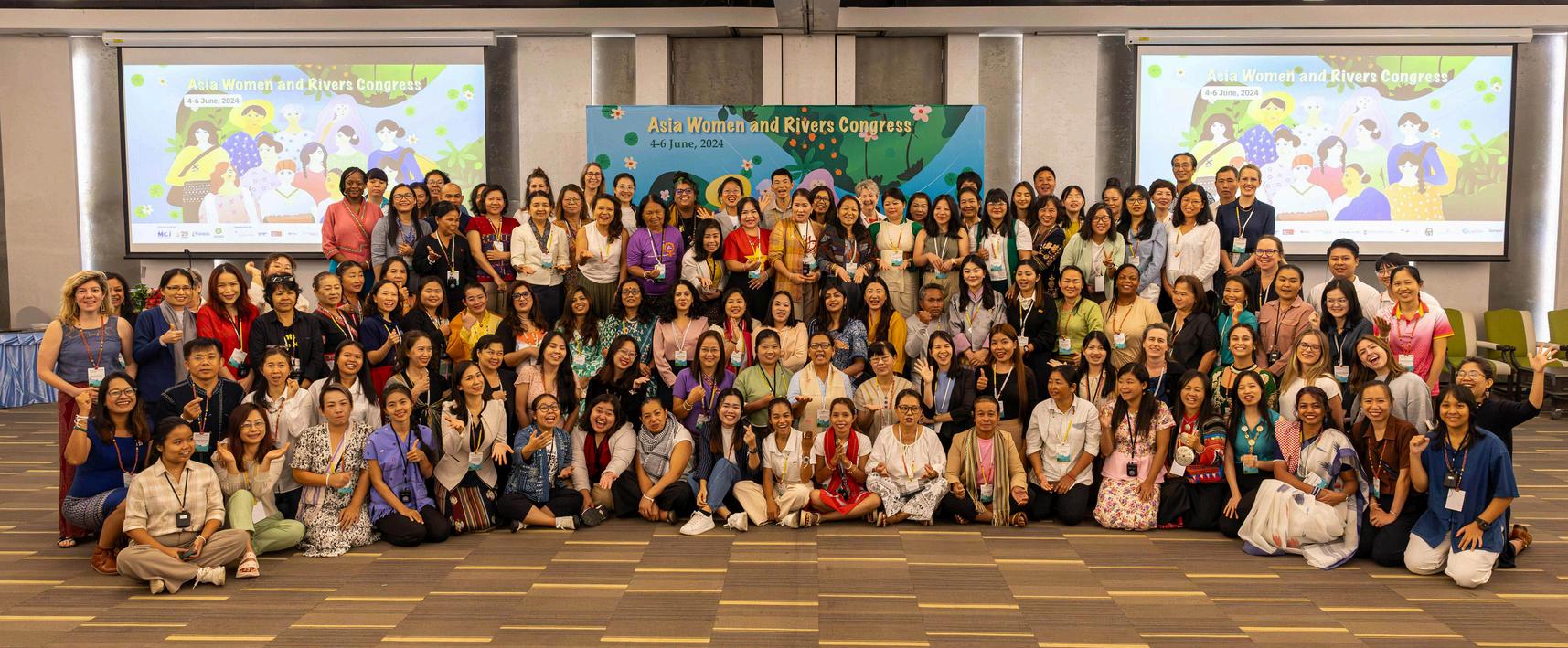

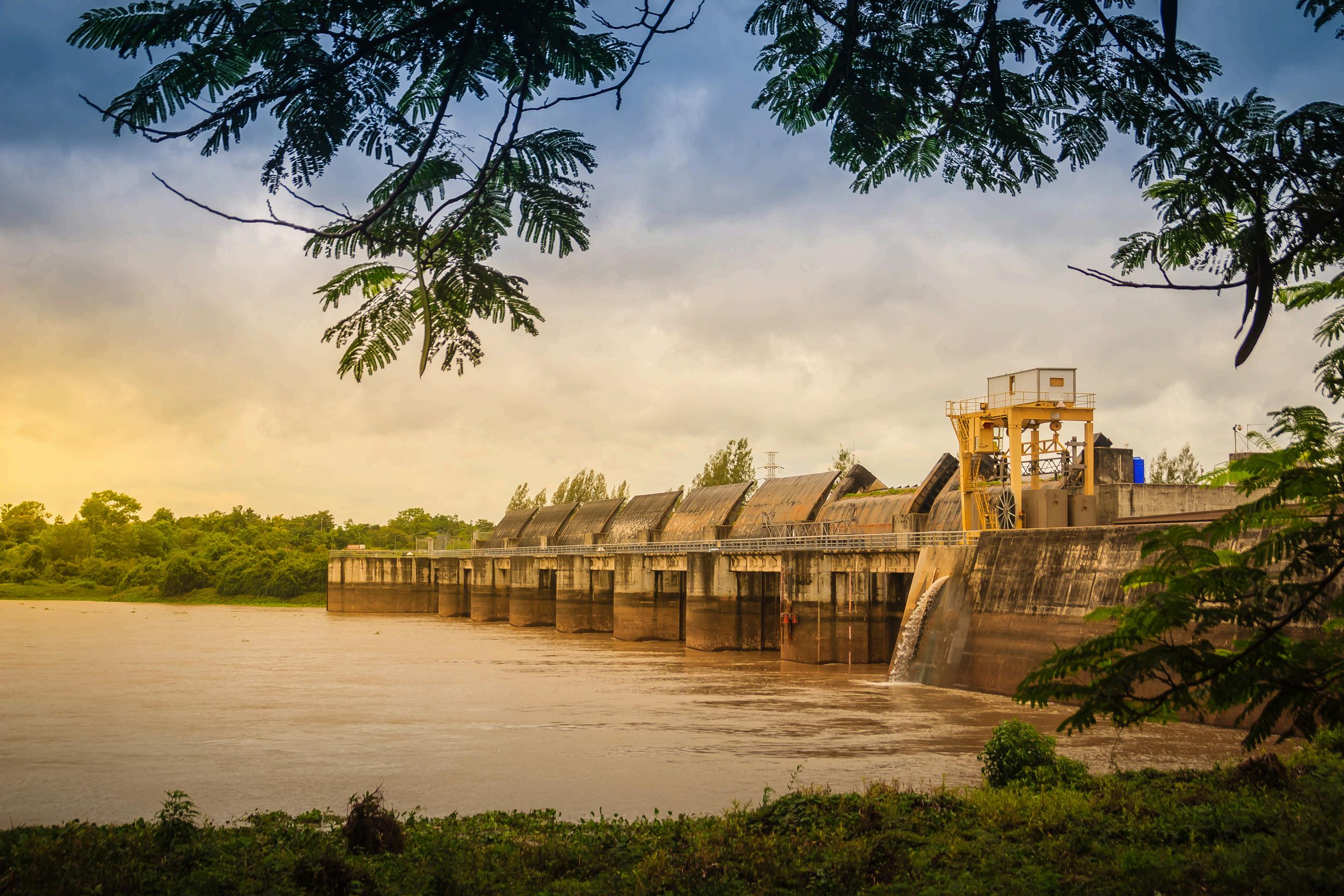
TheWorldBank-fundedPakMundaminThailand, openedin1994,isatestamenttothedisproportionate impacts,costs,andunmetpromisesofhydropower
Photocredit:ChristopherPB/Shutterstock
As world leaders gathered for the World Bank's Annual Meetings in October, over 100 civil society organizations mobilized to register their urgent concerns about the Bank's plans to return to financing mega-dams after a decade-long hiatus. Together, the Bank would approve billions of dollars for several highly controversial projects despite serious environmental and social risks
The Rogun dam in Tajikistan slated to be the world's tallest would displace 60,000 people, harm countless more, and destroy vital river ecosystems With a conservative $11 billion price tag and a 15-year construction timeline, it ranks among the costliest dams ever proposed and risks burdening Tajikistan with unsustainable debt
The World Bank approved the project in December, and International Rivers is supporting affected communities located downstream in an official complaint being investigated by the World Bank’s Inspection Panel over its environmental and social risks
Similar concerns surround Nepal's Upper Arun dam and the Democratic Republic of Congo's Inga project, which threatens to displace 30,000 people, many already impoverished by previous dam construction at the same site.


This renewed enthusiasm for mega-dams comes despite the Bank's own troubled history with such projects, which led to the creation of the landmark World Commission on Dams report that found that dams routinely engender unacceptably high environmental and social impacts.
The Bank’s resumption of support for dams also ignores global trends showing large hydropower falling out of favor due to high costs, declining output, and the climate crisis undermining its supposed benefits all while renewable alternatives become increasingly cost-effective
International Rivers is actively working with partners to challenge proposed World Bank dam projects, most notably in the DRC where we are sharing and developing strategies to contest the Inga 3 project, leveraging our years of experience getting public finance out of hydropower


SiziweMota,AfricaDirector,helpslaunchthe BioculturalCommunityProtocolinNamibia
In Africa, communities grapple with the effects of dams, extractive industries, and other infrastructure, which often displace people from their homes and damage the land and rivers they rely on for their livelihoods In 2024, International Rivers worked with our partners to support communities as they spoke up for their rights and against the effects of large-scale development projects
The Kunene River forms the border between Namibia and Angola, stretching over 1,000 kilometres with a catchment area of about 106,500 square kilometres The 881MW Baynes dam is slated for construction on this vital waterway The OvaHerero of the Kaokoland in Namibia and Angola, often referred to as the OvaHimba, are indigenous to both countries and have settled in the Kunene River valley for over 500 years
Siziwe Mota and members of the OvaHerero community celebrate the culmination of a four-year process to research and document their Biocultural Community Protocol.
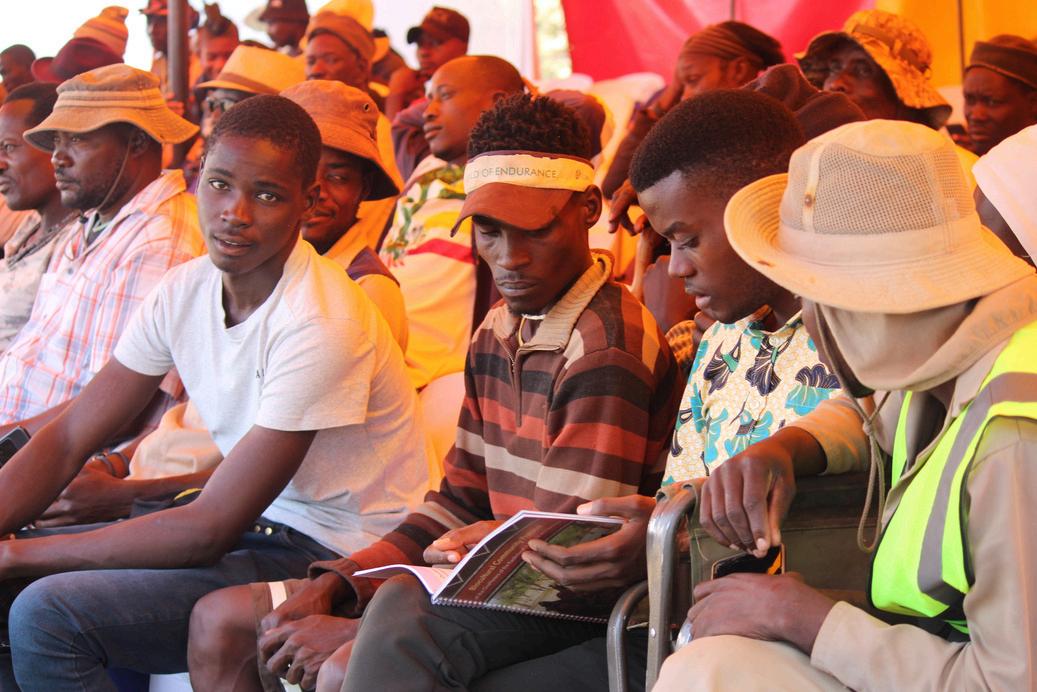


With support from International Rivers and Natural Justice, the OvaHerero community embarked on a four-year-long process of research and documentation to prepare their Biocultural Community Protocol (BCP) to safeguard the river, land, and their intangible cultural heritage. This culminated in the launch of their BCP in June in the Kunene Region in Namibia The launch, attended by over 200 members of the community, proudly presented the BCP to the media and representatives of civil society at large
The BCP is a community document that provides insight into their centuries-old cultural practices and protocols guiding the sustainable use of natural resources It provides an understanding of their Indigenous knowledge systems, governance, and decision-making
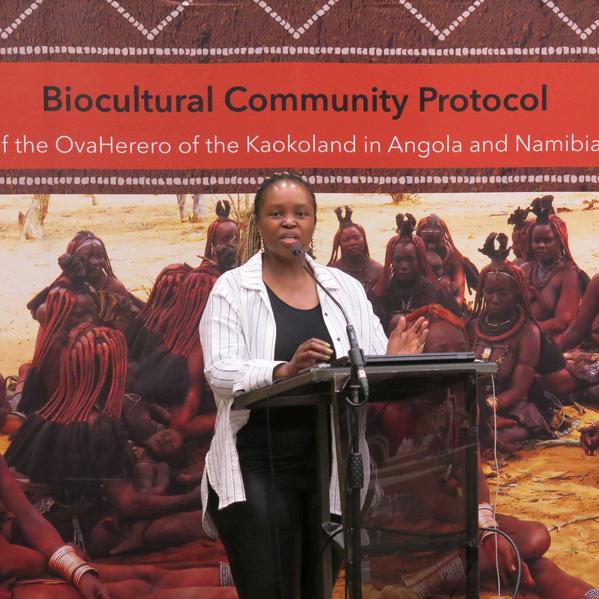
Photo:NatashaPrince/NaturalJustice
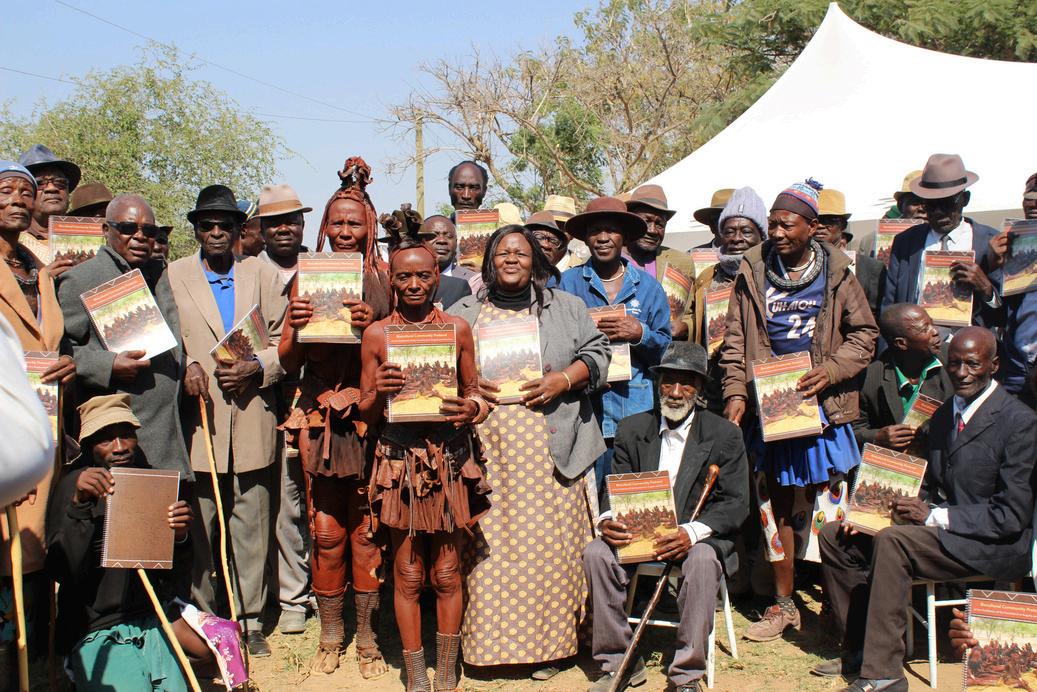
processes, and sets out challenges they currently face and their vision for their community The protocol emphasizes the importance of shared stewardship, promoting sustainability, equity and respect, and asserting the rights of communities, ensuring that external entities recognize and respect these rights
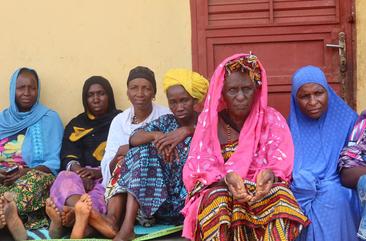
After the Souapiti Dam's completion in Guinea, International Rivers and local NGO CECIDE jointly visited affected villages to assess impacts. What we found was devastating: displaced farmers without electricity, water, or arable land –and voices that had gone unheard
In response, we gathered communities and officials for a workshop on environmental protection and human rights, producing recommendations for the Guinean government: adopt human rights approaches for infrastructure projects, ensure fair compensation for losses, and consider alternatives to hydropower.


As the OvaHerero face various challenges related to their natural and cultural resources, the BCP will serve as a bridge, translating customary practices into frameworks that modern legal systems can recognize and adhere.
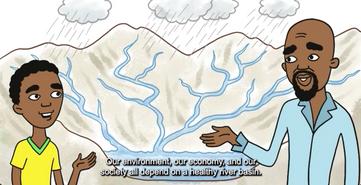
In May, we released a series of animations highlighting the importance of the Congo River a vital waterway in the region to frontline communities and the threats posed by dams
The animations helped illustrate the ways dams can impact their rights and livelihoods They also showed how communities can make sure their voices are heard when proposed dam projects threaten their lands and rivers.
Watch the full series now on International Rivers' social media platforms.


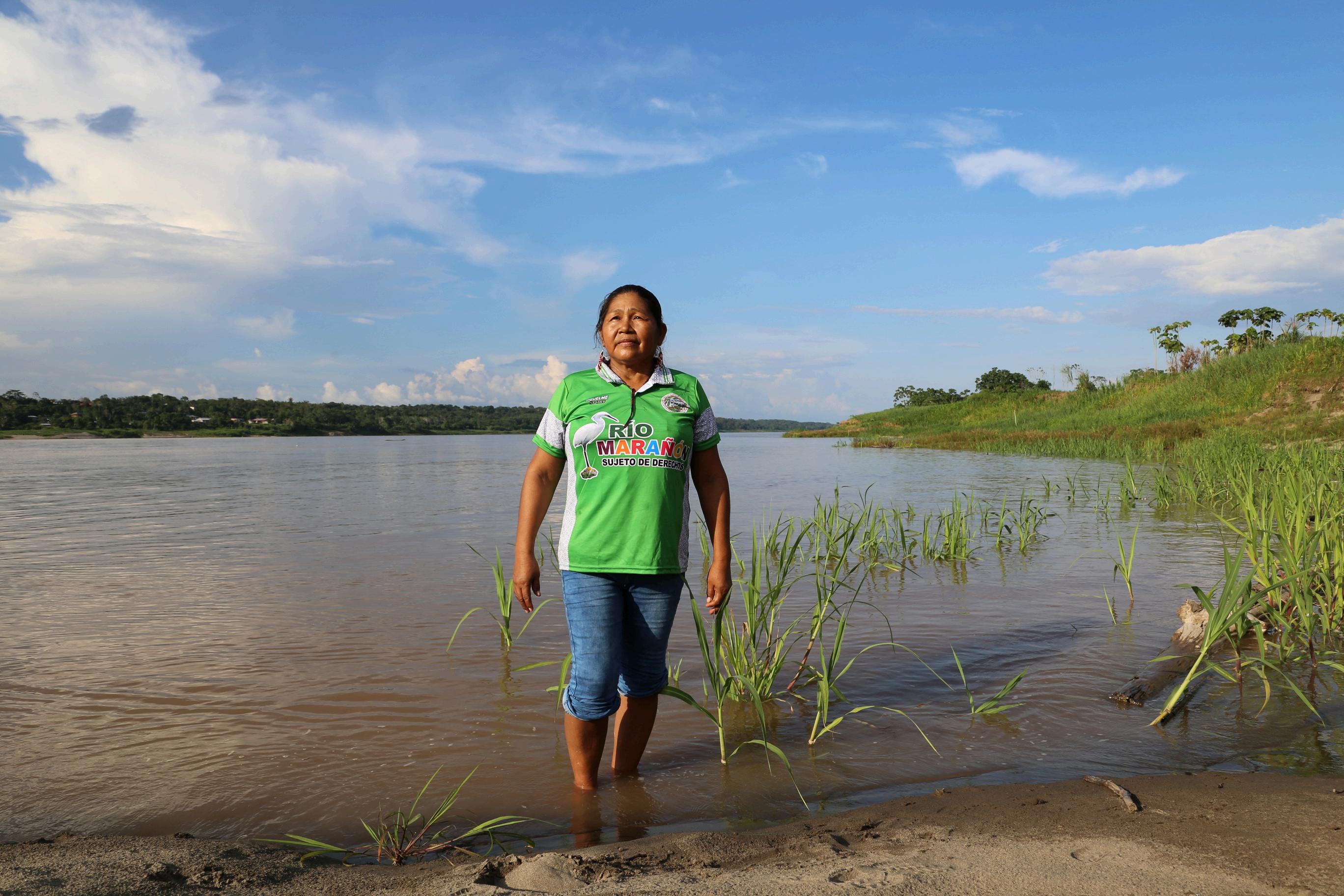
Mari Luz Canaquiri Murayari leads the campaign to save the Marañón River from oil contamination
Photocredit:MiguelAraozCartagena/Quisca
In Latin America, reckless development and the consequences of climate change threaten rivers and riparian communities, inspiring Indigenous movements to advance permanent protections for rivers by advocating for their legal rights
In September, the Biobío River became the first in Chile to receive a Declaration of Rights. This was the result of exhaustive studies and consultations along the river’s expanse and led by communities on the Biobío, including Defensa Ribera Norte Chiguayante and Malen Leubü, supported by International Rivers and partners.
The Declaration seeks to rekindle the connection between communities and their river while safeguarding them from potentially dangerous development and infrastructure. It also underscores the river’s significance within local ecosystems and the cultures of riparian communities that depend on it
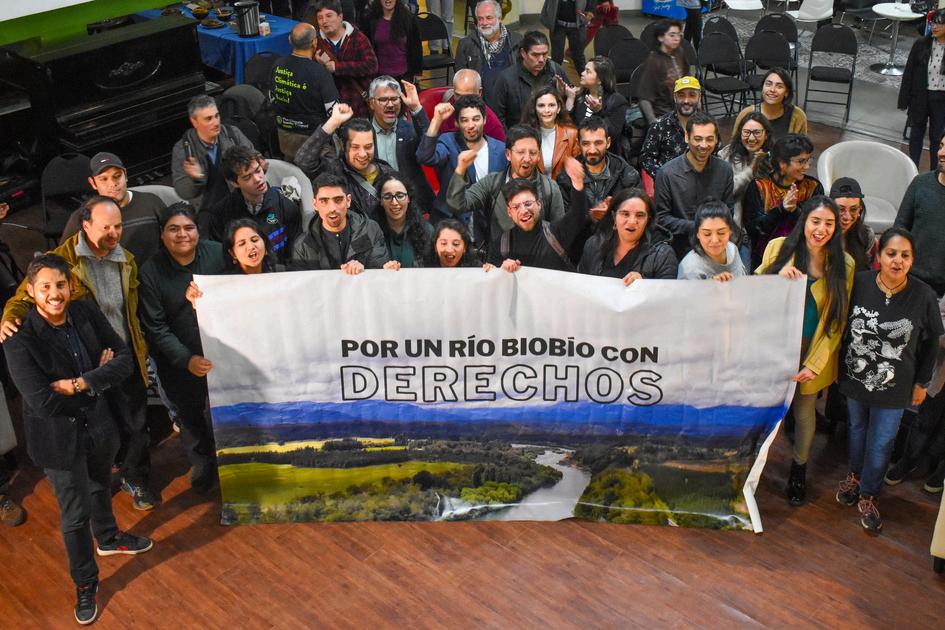


In March, the Mixed Court of Nauta in Peru ruled that the Marañón River had intrinsic value and affirmed its right to exist and be pollution-free. The court also appointed the Peruvian government and Indigenous organizations as guardians and defenders of the Marañón.
This ruling represented a major victory Galvanized by decades of environmental harm, Indigenous Kukama women had launched a legal battle in 2021 against Petroperú and Peruvian authorities, demanding recognition of the Marañón River’s rights and protection from ongoing oil spills
This April, Mari Luz Canaquiri Murayari was awarded the Goldman Environmental Prize for her leadership of this effort
Meanwhile, river defenders in Northern California celebrated as the Klamath River ran free for the first time in a century.
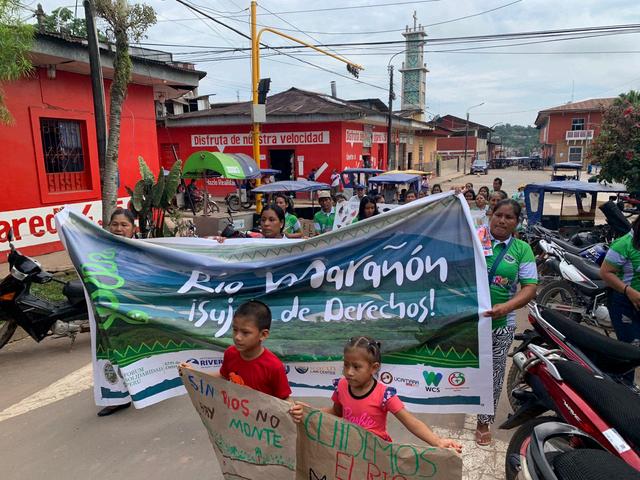

In August, the final coffer dams were removed, allowing the Klamath River to return to its natural course This milestone marks a significant step toward restoring a critical watershed and is expected to help revitalize the cultural traditions, ecological balance, and economies of several Tribal Nations long connected to the river
Expanding the River Protection Movement: From Latin America to the Congo
Building on landmark victories in Latin America, we are expanding our approach for permanently protecting rivers to new watersheds facing critical threats

In Brazil's Tapajós River basin, we ' re documenting the threats to biodiversity and Indigenous territories including dozens of planned dams and the controversial Ferrogrão railway and scoping the most promising pathways for securing permanent protections
By adapting successful legal strategies from the Marañón case as well as precedents and laws within Brazil, we ' re working with partners including the Movimento Tapajos Vivo and representatives of the Munduruku to develop a comprehensive legal protection strategy
In September, we convened key partners and experts in Santarém, along the banks of the Tapajos, to advance this collective agenda
The gathering brought together 56 representatives from socioenvironmental organizations and Indigenous and local leaders to inform legal analysis of the prospects for permanent protections, including pursuing a rights of nature approach The event further explored collective strategies for strengthening legal protections for the Tapajós and the communities and biodiversity it sustains
Meanwhile, we ' re now transferring this Latin America-born approach to the Congo Basin in Africa, where local lawyers and our partners are assessing the most promising pathways for river protections in the Democratic Republic of Congo
This cross-continental exchange represents a pivotal expansion of the movement to permanently protect rivers, offering communities powerful new tools against extractive industries while honoring Indigenous perspectives on the inherent value and rights of waterways
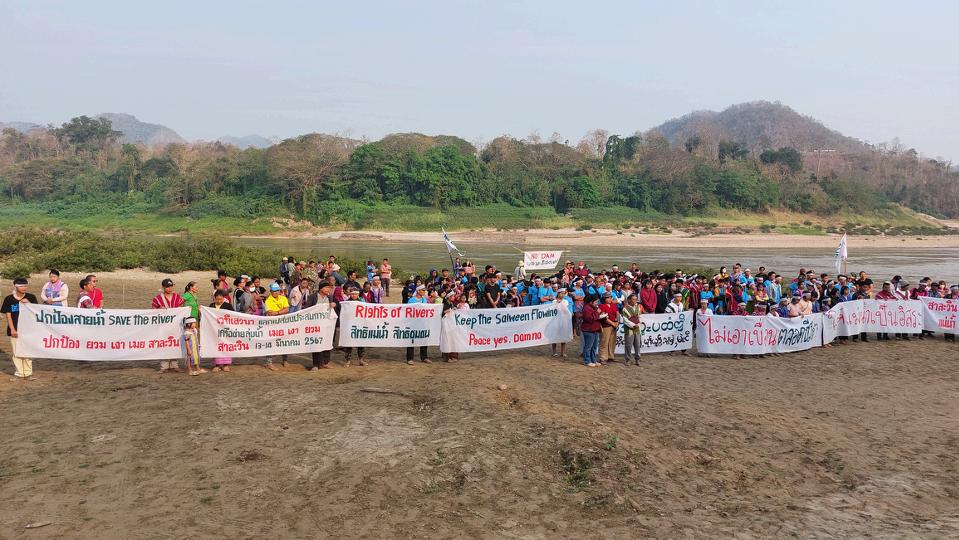
In 2024, International Rivers and partners continued to amplify and elevate community and civil society voices and actions, highlighting the threats posed by large dams in the Mekong and Salween basins Strong and sustained mobilizations, collaborations with researchers, and extensive media engagement and coverage have contributed to key actors such as Thailand’s National Human Rights Commission, Members of Parliament, and Thailand’s National Ombudsman Office echoing key concerns and recommendations of riverine communities and civil society
In January, the Chiang Mai Administrative Court accepted a lawsuit filed by communities in late 2023 against the Yuam-Salween Water Diversion Project While the lawsuit is ongoing, it has succeeded in suspending the controversial project
Throughout the year, International Rivers worked with partners to monitor climate and energy transition finance frameworks and advocate for finance that protects human rights and environmental defenders, ensures community participation in decision-making, and supports truly just and sustainable energy solutions. This included our work to analyze Vietnam’s Just Energy Transition Partnership (JETP) and engage the governments and financial


The Missing Just in Vietnam’s JETP,
institutions involved Together with the Vietnam Climate Defenders Coalition, we published a report, The Missing Just in Vietnam’s JETP, calling for justice to be central in the design and implementation of the JETP and other climate and energy transition financing
International Rivers continued to advocate for the rights of river defenders facing reprisals and criminalization for their work. In September, we joined partners in Southeast Asia and beyond to celebrate the early release from prison of climate advocate and environmental defender Hoang Thi Minh Hong.
Detained by Vietnamese police in May of 2023, Hoang was later sentenced to three years ' imprisonment on bogus tax evasion charges The charges against Hoang are part of a broader global trend to silence environmental and human rights activists who raise legitimate concerns about largescale development and advocate for sustainable energy solutions Despite this, the response of civil society organizations to demand her release, and that of other defenders such as environmental lawyer Dang Dinh Bach, who remains incarcerated demonstrate that the movement to demand a just energy transition is gaining momentum and cannot be ignored


We support river defenders by creating reports and guides that address systemic challenges, while also helping to disseminate local and Indigenous knowledge essential for sustainable river governance.

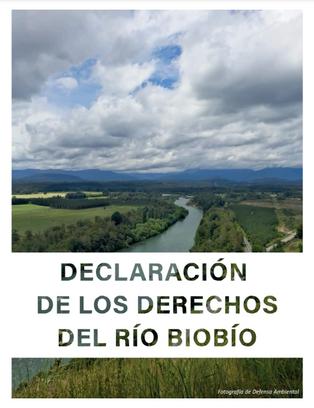

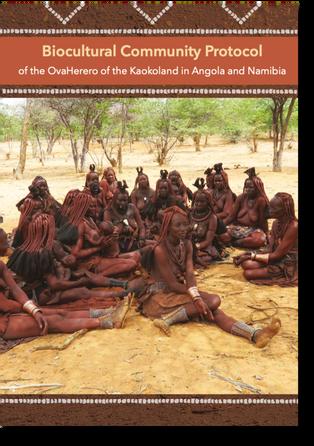

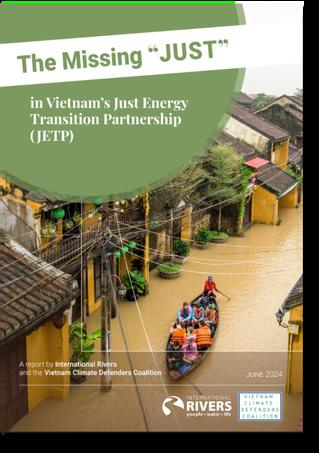
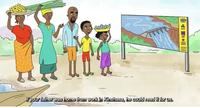

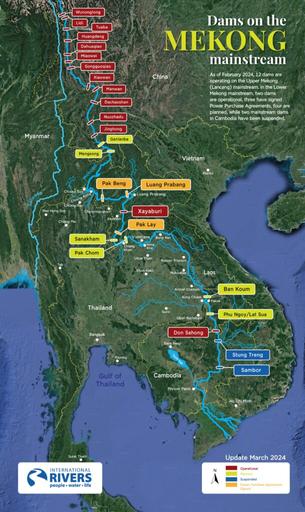

111 eventsregistered (↑50%over2023)
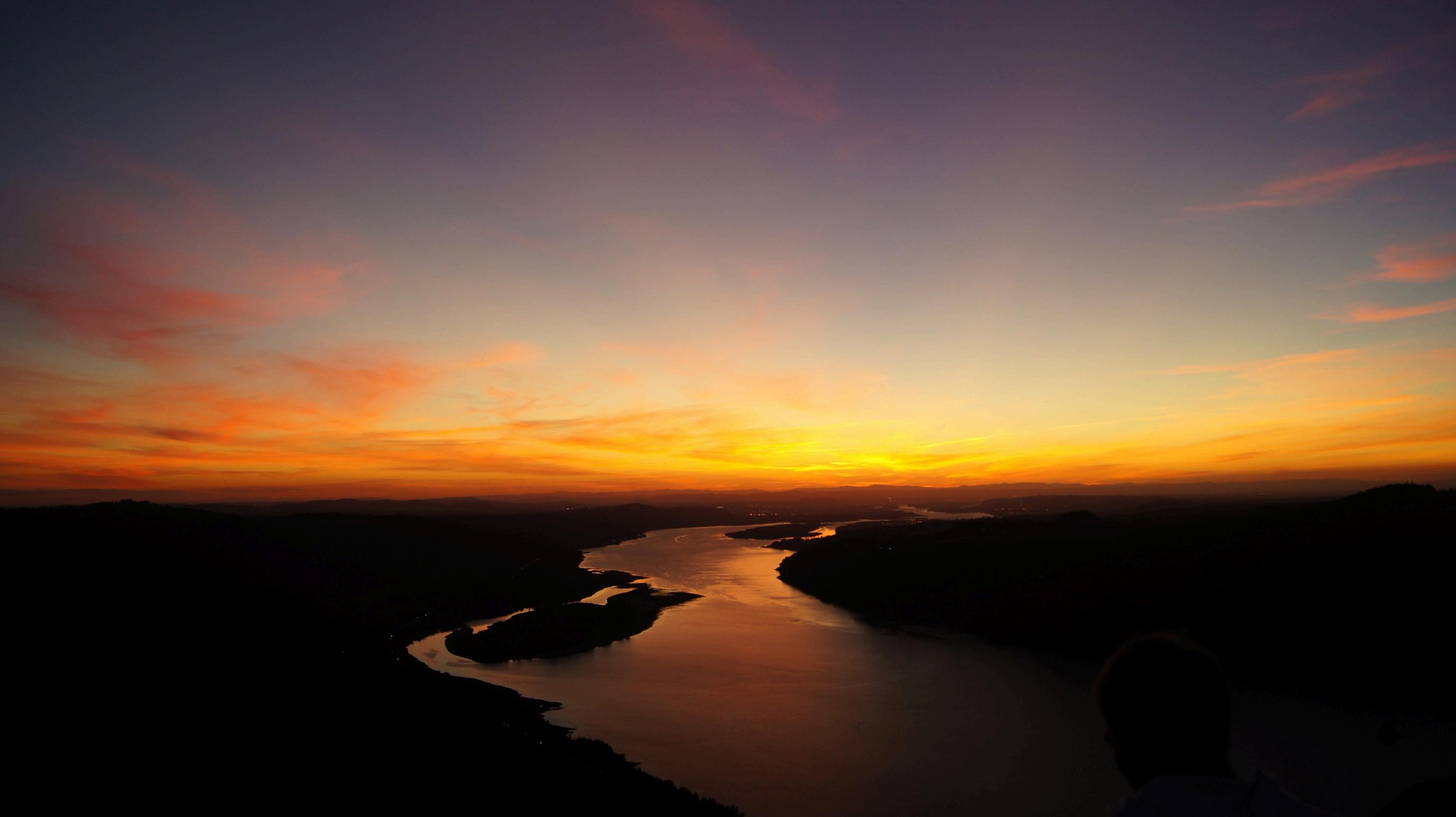
125 womenleadersfrom 18countries
$522,000 (↑42% over 2023)
Small grants directly supporting communities and partners on the ground* InternationalDay ofActionforRivers
Our Digital Impact
Views on Youtube channel Unique users across all platforms
451 (↑140%over2023) ↑310%
1,079 miles of Marañón River permanently protected 437,000 92,350 at 2024 Asia Women and Rivers Congress Media mentions of our work
43 countries o *Total includes $400,000 directed through grant-making partnership (not reflected in our financial statements)

1,677,825


While space prevents us from naming every generous donor, we extend our heartfelt gratitude to all who have supported our mission this year Every contribution, regardless of size, has been instrumental in our success Thank you for your belief in our work and for making a difference
Anonymous
11th Hour Project, Schmidt Family Foundation
American Jewish World Service
André Carothers
Andre Rollinger
Arcus Foundation
Bonnie Raitt/ARIA Foundation
Claire Adler
Conservation, Food & Health Foundation
Critical Ecosystem Partnership Fund
Daughters for Earth
Earth Law Center
Effie Westervelt
Faye Harasack
FILE Foundation
George Martin
Goldman Environmental Foundation
Global Greengrants Fund
Holdfast
Collective/Yvon and Malinda Chouinard
Jacob Sigg
Janet Anderson
Jenckyn Goosby
Jonmin Goodland
Joshua Sperry
Lisa Gautier
Nance Hikes
Neerja Bhatt and Ani Vaidya
New Venture Fund
Open Society Foundations
Orchard House Foundation
Paul Strasburg
Rosalind Seysses
Synchronicity Earth
Theodore Von Der
Ahe
Winky Foundation/Gail Milliken
We sincerely apologize for omissions and errors. Please contact 510-848-1155 with any corrections.
Our team:
Monti Aguirre
Isadora Armani
Sanita Auttopakorn
Bonnie Barclay
Kirk Barlow
Ayesha D’Souza
Pianporn Deetes
Stephanie Gaylard
Maureen Harris
Carly Holencik
Sandie Hum
Guneet Kaur
Josh Klemm
Ashish Koradia
Gary Lee
Anake Lekkoon
Flávio Montiel
Siziwe Mota
Genny Ngende
Tanya Roberts-Davis
Phairin Sohsai
Somsak Soonthornnawaphat
Phanpaporn Tameyasan
Isabella Winkler
Intern:
Lucian Scher


Our board:
Melina Selverston (Chair)
Chance Cutrano (Secretary/ Treasurer)
Evelyn Arce-Erickson
Lisa Craig Gautier
Donna House
Sharon Khan*
Astrid Puentes Riaño**
*Resigned 2024: Conflict with OneReef US Director role **Resigned 2024: Appointed UN Special Rapporteur on right to clean, healthy, and sustainable environment
